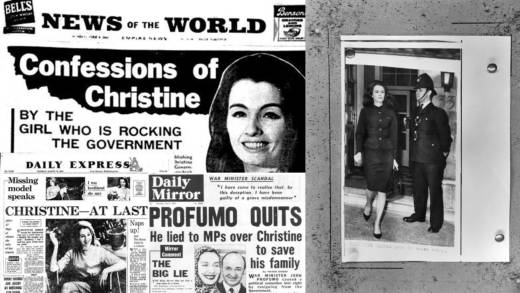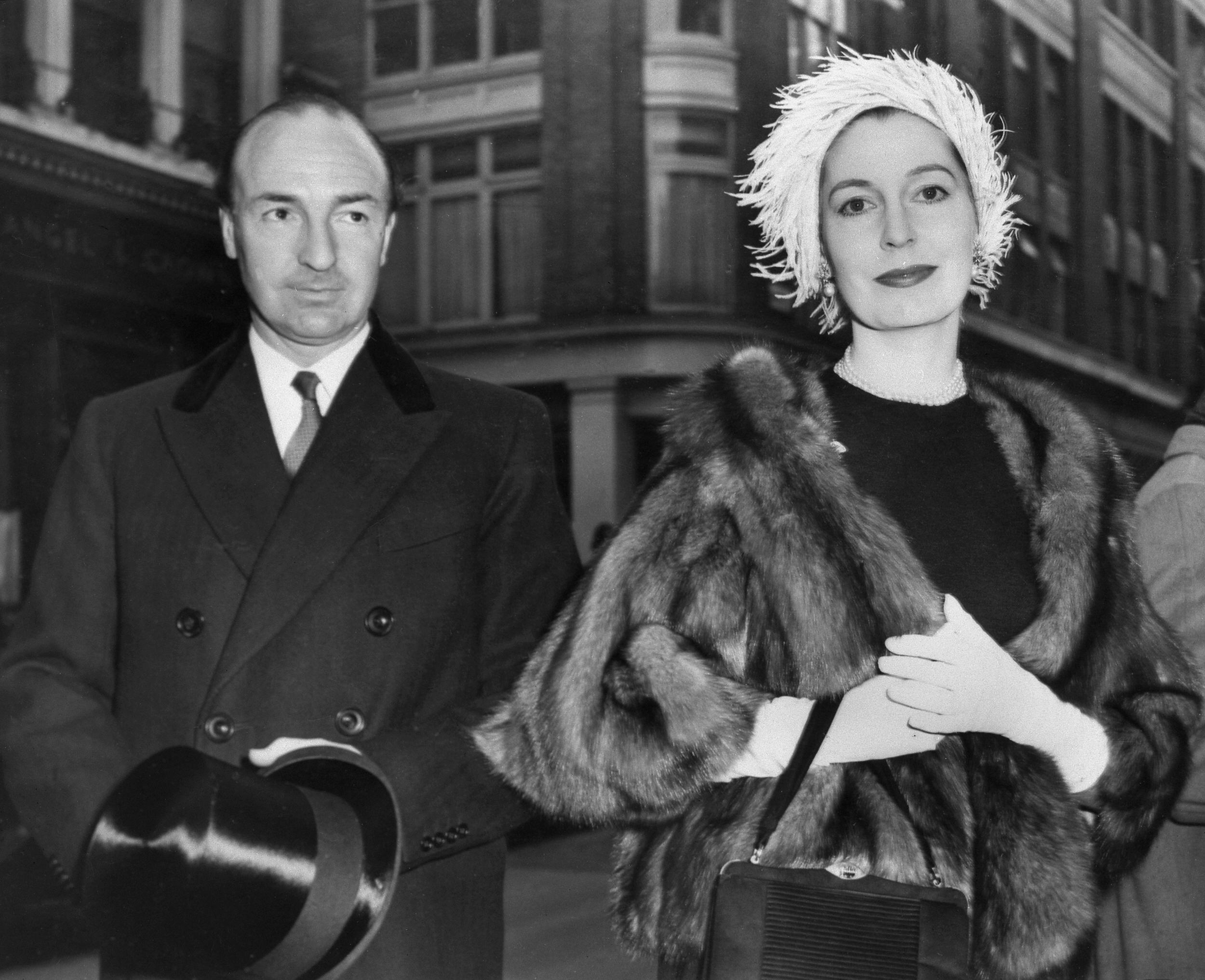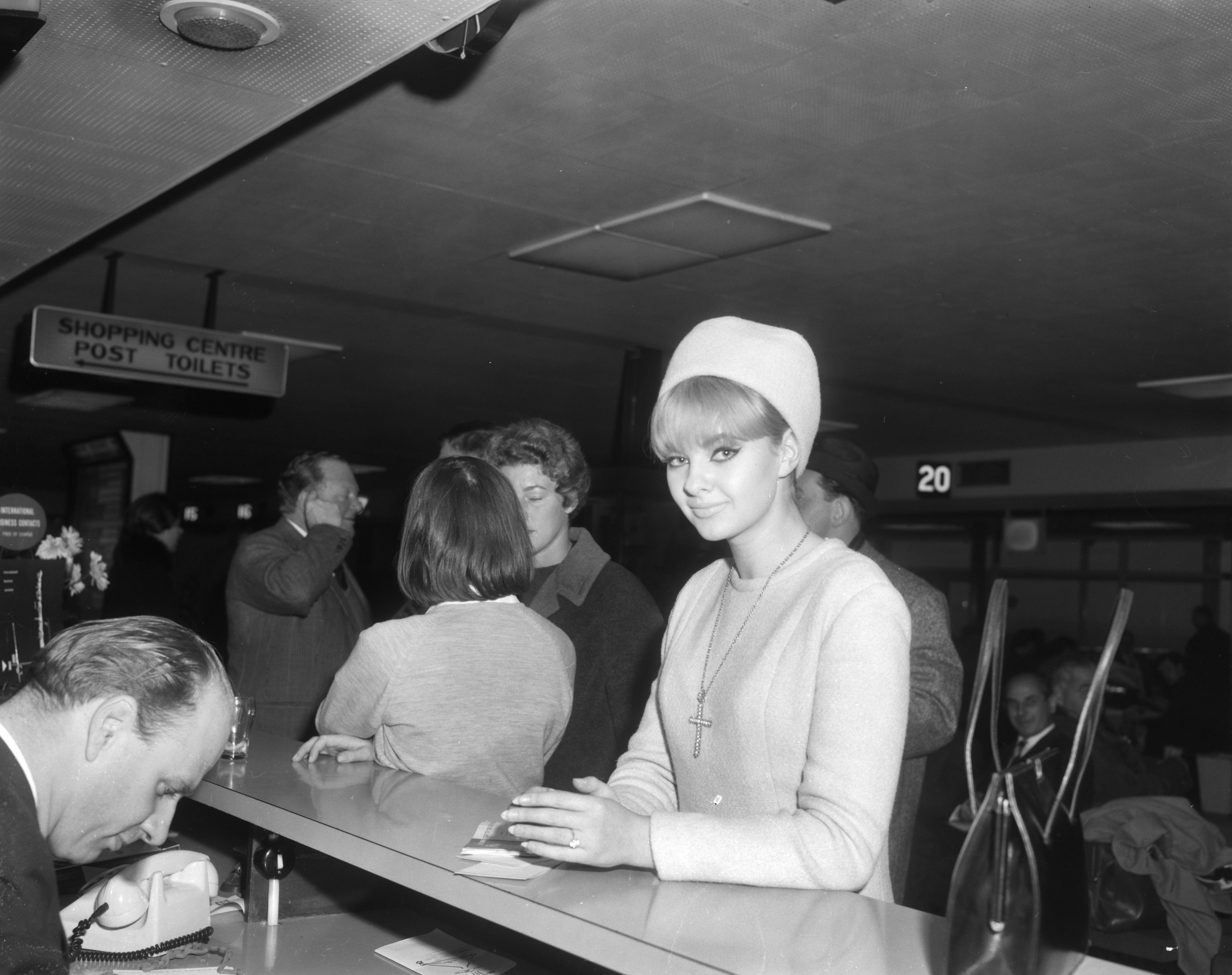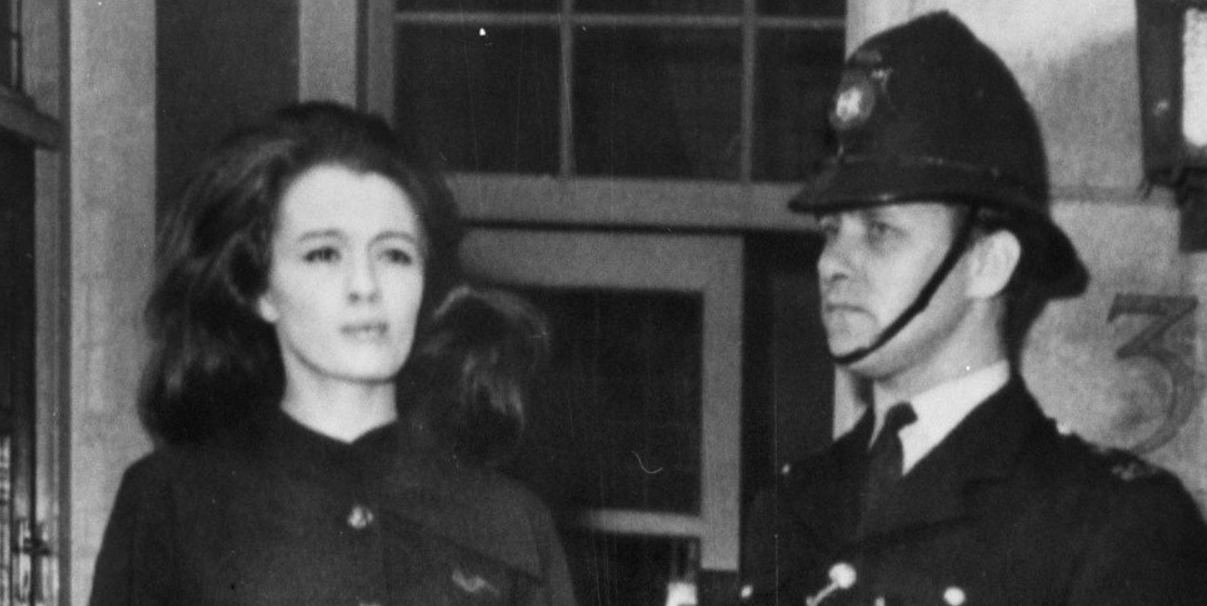Listen to this post on The Cooler, KQED’s weekly pop culture podcast.
The Profumo Affair: A '60s Political Scandal for 2018

55 years ago, it was one of the most explosive, far-reaching public scandals the UK had ever seen. It started -- as most government sex scandals do -- with a middle-aged male politician being involved with a woman decades his junior. It ended with Russian collusion, perjury, jail, death, disgrace, and the ultimate downfall of an administration. And over half a century later, a number of elements might seem oddly… familiar.
The ‘Profumo Affair,’ as it would come to be known, was set in a '60s Britain that was definitely not yet “swinging.” When events began in 1961, the food rationing instigated during World War II had only finally ended seven years prior. The contraceptive pill wasn’t yet available to women around the country, and the Beatles were relative unknowns.
The Profumo in question was a 46-year-old married politician named John Profumo, the government’s Secretary of State for War. Despite frequent rumors about his infidelities, Profumo was an uncontroversial figure -- rich, successful -- at the very top of UK politics. Until he attended a high-class party in July 1961 at the country estate of his political pal Lord Astor -- and saw a young woman called Christine Keeler swimming naked in the pool.

Keeler, who was 19 at the time, was an aspiring model, then working as a topless showgirl in a London cabaret club. The working-class Keeler was mingling with the rich and famous at Astor’s party because of her connection to another much older man there: Stephen Ward. He was a trained osteopath whose charm -- and ceaseless social-climbing -- had resulted in an impressive list of connections and clients that ranged from socialites and aristocrats to members of the UK royal family. One of his friendships in particular -- with a Russian official and London-based spy named Yevgeny Ivanov -- had even attracted the attention of British intelligence agency MI5.
When Ward wasn’t cracking the backs of the rich and famous, or playing Russian and British spies off each other, he was hanging out in London’s club scene, where he’d first met Christine Keeler. Sensing that having a gorgeous young showgirl close to him might come in handy in his multiple endeavors of varying legality, Ward took Keeler -- plus her friend Mandy Rice-Davies, who was even younger -- under his wing.
Keeler and Profumo soon began a sexual relationship after their poolside meet-cute, but here let’s pause -- lest you think this is just another story about a powerful man having an affair -- and remember Russia. In 1961, the Cold War was a suffocating presence in geopolitics. Then, as now, Russian influence in domestic affairs was a terrifying prospect. In a time when the USSR was testing huge nuclear weapons, the Berlin Wall had just gone up, and the Russians were looking like they could conquer space too, it’s almost impossible to overstate the UK’s fear and apprehension over Russia’s reach.

Against this backdrop, the very worst person for the mistress of UK Secretary for War John Profumo to simultaneously be sleeping with would be a Russian spy. But of course, that’s exactly who she was sleeping with: Ward’s old pal Ivanov, with all the collusion-friendly “passing state secrets during pillow-talk” potential that brought. Even though the affair between Keeler and Profumo -- which she described as "screw of convenience" -- wound down fast, rumors soon began swirling in London.
Yet despite mounting conjecture, the press wouldn’t touch the story. The Conservative government of the time had been engaged in fierce hostility with the press, and amid a string of much-reported spy scandals in early ‘60s Britain, the USSR’s blackmail of civil servant John Vassall stood out. Many of us only learned the term kompromat following allegations about Donald Trump’s 2013 visit to a Moscow hotel room, but the tactic of gathering and deploying damaging information for political benefit has been in use for decades by Russian intelligence.
In 1962, they had successful leveraged proof of Vassall’s sexuality -- being gay was illegal until 1967 in the UK -- to pressure him into spying for them. In the fallout from the subsequent inquiry, two British journalists were jailed for protecting their sources, in a move that hugely damaged relations between the administration and a defensive media. So even by 1963, when Christine Keeler sensed rising interest and attempted to sell her account to the press, she wasn’t successful at first.

The story became harder to ignore, however, when a former boyfriend of Keeler’s went on trial for shooting up the house in which she was staying -- of course, Stephen Ward’s house. As speculation mounted about Profumo’s involvement in this bizarre series of events, the politician’s strategy for handling media interest in his affair was to go on the offensive, threatening to sue -- and actually suing one outlet for libel -- and discrediting the stories as what we’d now refer to as “fake news.”
In 1963, Bill Clinton was only 17 years old and 3,000 miles away in Arkansas when Profumo gave a formal statement to his government that "there was no impropriety whatsoever in my acquaintanceship with Miss Keeler." This was, of course, the lie that would ultimately damn him, as the UK police authorities began to investigate the man whose connecting and fixing had powered this whole scandal forward: Stephen Ward. As official statements and evidence piled up, Profumo realized the game was up, confessed all, and resigned.
Now that the British press, which now included the increasingly popular medium of television, finally considered themselves unleashed, the characters of Profumo and Ward were mercilessly scrutinized, the former portrayed as duped sleaze ball, the latter as pimp and Russian colluder. Meanwhile, Keeler and her friend Mandy Rice-Davies found themselves subjected to more gendered criticism from both the press and politicians.
They were branded with terms like “whore,” “slut,” and “dirty little prostitute” by male politicians of the time who were incensed not just at the potential damage to national security, but by the way the scandal opened the floodgates for a glut of subsequent stories alleging misconduct and sexual impropriety among the ruling classes. Rumors of sex parties, affairs, even masked naked royals at orgies, trashed the myth of upper-class respectability, and lifted the lid on a sex-fueled world that relied on the services of men like Stephen Ward, and the bodies of working class women like Keeler and Rice-Davies.

To modern observers there might be echoes of how someone like Stormy Daniels -- another woman making her living from erotic entertainment, alleging sexual relations with a powerful man who’s denying it -- deals with her critics. In the same way, Daniels receives the words intended to silence women like her -- slut, whore -- on Twitter as her cue to speak more, not less.
Keeler and Rice-Davies simply refused to be quiet or go away. At the height of the Profumo scandal, Keeler sat for a now-iconic, much-imitated nude photo shoot, in which she meets the viewer’s gaze directly, as if to say “How do you like me now?” For her part, the teenage Rice-Davies entered courtroom clap-back folklore, when asked about her alleged affair with Lord Astor (the politician, remember, who hosted that fateful 1961 party), and the fact that this powerful man almost 40 years her senior had denied everything. Her response: “Well, he would, wouldn’t he?” These five words have since become skeptical internet shorthand.
So how did this all end? With death, disgrace, and the fall of a government.
Stephen Ward was put on trial on pimping charges, but on the eve of his sentencing, he was found dead of an apparently self-administered sleeping pill overdose. To this day, some suspect foul play on the part of those about whom he might have known too much. His protégée Christine Keeler received six months of jail time for perjury during the trial of another ex-boyfriend, whom she’d claimed attacked her. And a government inquiry exonerated Profumo of inadvertently passing state secrets to the Russian authorities, but later in 1963, Prime Minister Harold Macmillan fell ill and, at least partly exhausted by this relentless scandal, resigned. The Conservative party didn’t regain power again until 1970.

Amid all the startling parallels to modern politics and public life, there’s one final element of this story that surprises: what John Profumo did next, after being caught in one of the biggest sexual misconduct scandals the UK had ever seen.
Months after the explosion of the #MeToo movement, we now find ourselves wondering what, if anything, we’re meant to do with an ever-growing list of disgraced men, many of whom are now actively planning their comebacks with varying degrees of humility. Total self-exile seems to be beyond most of those whose reputations now lie in tatters of their own making, yet over 50 years ago, that’s exactly what Profumo himself chose.
After apologizing to the prime minister, his political party, and the general public, he became a volunteer at an East London anti-poverty charity, where he quite literally scrubbed toilets. After that first self-flagellating penance as a quasi-janitor, Profumo continued volunteering there in administrative and fundraising roles. Right up until his death at age 90 in 2006, Profumo gave not one single interview -- no mea culpa profile, no humble photo shoot. Others -- including Prime Minister Margaret Thatcher -- spoke about him, and praised the re-dedication of his life to charity, but in a world of the swiftly-issued apology (or denial), Profumo’s own deafening silence is now almost unthinkable.
You’re entitled to your skepticism about the low stakes inherent in a man with vast inherited wealth being able to volunteer for the rest of his life, but the fact remains: Profumo’s charity atonement took place without the “story-straightening” soul-baring interviews, or the big symbolic “welcome back” to public life, and lasted decades, for the rest of his life. For a man who once wielded such agency, whose voice carried such weight, mute self-exile feels like the ultimate renunciation of male power. How telling that the powerful men accused of far less consensual sexual behavior, over five decades later, won’t even seem to consider the same route.
This piece was inspired by an episode of The Cooler, KQED’s weekly pop culture podcast. Give it a listen!

